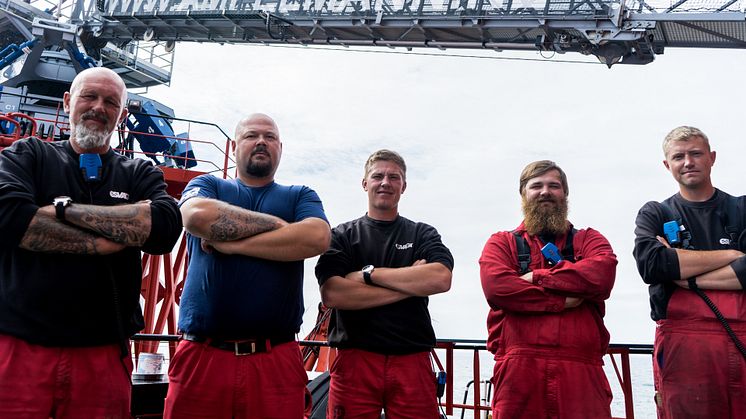
Press release -
MLC will strengthen ESVAGT
New rules and demands on personnel care will make it more difficult to operate for companies with low regard for personnel. ESVAGT sees the new demands as a strengthening of its competitiveness.
As an employee in ESVAGT there are things that you take for granted:
Focus on safety. Salary paid on time. The right to complain. Good food on board. Training for the work one has to carry out – and a lot more.
But it is far from all seafarers who are working with such truisms in everyday life. A new initiative will now try to do something about that.
MLC – Maritime Labour Convention – is a convention whose purpose it is to ensure sailors all over the world a common minimum of rights and working rules.
- In a lot of cases there are sailors who turn up at insecure work places and where they work under very poor conditions, says Jesper Nielsen, HSEQ in ESVAGT:
- For many years attempts have been made to create some standards that can be agreed on and that will ensure the sailors have proper working conditions and treated well. Such framework has now arrived, and we are pleased to welcome this in ESVAGT. It will make competition more equal, he says.
Behave properly
The Danish fleet – and this will include ESVAGT as well – has always had a high standards as a working place. This also means a high cost level that will again affect competitiveness. Therefore, common minimum requirements will also be of importance for ESVAGT’s opportunities for being competitive.
- First and foremost, it is very pleasing to the individual seafarer that proper working conditions will now be in place. Next it is a good thing for us and other shipping companies like us that it will be more difficult to run businesses that do not give high priority to personnel care and a proper working environment, says Jester Nielsen:
- For us in Denmark it is a matter of course that employees are treated properly – and we know that short term or long term it is the only way in which you can run your business. But the new initiative means that from now on it will be even better than before to behave properly towards the employees. And that is good news for those of us who actually do this already, he says.
Closed territory
MLC consists of 14 points (see facts box at the end of the article). It is up to the individual countries to decide if they want to ratify the MLC – i.e. put the MLC points on the Statute Book in the country concerned – but a lot of countries have already acceded to the convention. And even if some countries choose to be outside the MLC cooperation, vessels under flags outside the MLC cooperation may have problems with the working environment anyway.
- A new initiative is that port state can require that the MLC is lived up to in order to dock in the harbour. That will make a difference as there will be countries you cannot call at if you do not offer your sailors proper conditions, says Jesper Nielsen.
The Veritas Bureau has at the moment of writing this carried through 11 MLC audits on ESVAGT vessels. All audits went well – also the audits carried out on ESVAGT vessels in Belgium, Egypt and Norway.
- The crews on our vessels have managed very well to adapt our rules to the requirements made by MLC. Most of the requirements were met already either via international rules, member state flags rules or agreements, and in many areas we, as a Danish company, are far ahead of the requirements put forward.
- We have, however, checked every single point and found that we live up to the requirements. Some of the subjects mentioned are so integrated in our company culture that we had not even bothered to write them down – but now we have. For example, we have now made the sailors’ right to complain clearer, so that it now lives up to the formulation in the MLC as well, he says.
- I hope that joint working environment rules will benefit those of us who have always behaved properly. It is going to be more difficult to stimulate competitiveness by making savings on working environment, accommodation, wages and food for example, Jesper Nielsen explains.
Facts
The 14 requirements of the MLC:
1. Minimum age.
2. Health certificate. (Blue book).
3. Training of sailors.
4. Recruitment / employment contract.
5. Shipping agencies and the use of these.
6. Rest hours.
7. Manning level.
8. Accommodation.
9. Recreational facilities on board.
10. Galley / meals and catering / Hygiene.
11. Health, safety and prevention of accidents.
12. Medical care.
13. The seafarer’s right to complain.
14. Salary / payment.
Topics
Categories
ESVAGT is a dedicated provider of safety and support at sea, founded on an experienced and well-trained offshore crew and unmatched rescue capabilities.
We support the offshore Oil & Gas industries with a wide range of specialized services: Standby, Emergency Response and Resque Vessels (ERRV), Oil spill response, Firefighting, Tanker assists, Rig moves, Supply services and Interfield transfer of cargo and personnel.
In 2010, ESVAGT brought the dedicated offshore wind Service Operation Vessels (SOV) to the market. The SOVs provide accommodation for up to 40 technicians, storage for small turbine parts and a workshop, plus personnel and equipment transfer capabilities by either Walk-to-Work gangway system or Safe Transfer Boats.
ESVAGT was founded in 1981 and has a fleet of more than 40 vessels and more than 900 employees on- and offshore.

